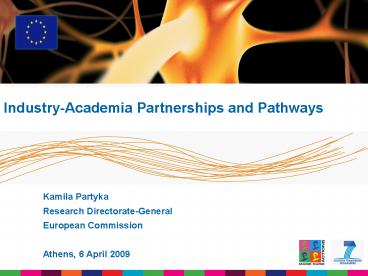People Programme PowerPoint PPT Presentation
1 / 21
Title: People Programme
1
Industry-Academia Partnerships and Pathways
Kamila Partyka Research Directorate-General Europe
an Commission Athens, 6 April 2009
2
FP7 overview (2007-2013)
EUs main instrument for funding research
Aim Contribute to EU becoming the worlds
leading research area
Total FP7 budget M 50 500
FP6 (2002-2006)Marie Curie Actions
1580 million
3
People Programme in FP7
- People Programme Marie Curie Actions
- Objectives
- Strengthening the human potential in RD in
Europe - Stimulate people to enter into the profession of
researcher - Encouraging researchers to stay in Europe
- Attracting researchers from around the world
- Addressed to researchers at all stages of their
careers
4
Marie Curie Actions
Main characteristics
- Open to all domains of research (bottom-up
approach) - Application through calls for proposals
- Selection criteria
- ST quality
- Training/Transfer of Knowledge
- Implementation
- Impact
- Trans-national and inter-sector mobility
- Budget covers mainly salaries of researchers
5
Marie Curie Actions
Funding Schemes
Initial training Initial Training Networks (ITN)
Life-long training and career development Intra-Eu
ropean Fellowships (IEF) / Reintegration Grants
(RG) Co-funding of regional, national and
international programmes (COFUND)
Industry dimension Industry-Academia Partnerships
and Pathways (IAPP)
International dimension Outgoing Incoming
International Fellowships (OIF IIF)
International Cooperation Scheme (IRSES)
Specific actions Researchers Night EURAXESS
6
IAPP Objectives
Foster co-operation between non-commercial
organisations active in research commercial
enterprises based on joint research
projects. Stimulate long-term collaboration
between sectors through secondment of researchers
between the public private research domains.
Diverse career possibilities research
experience for researchers, knowledge
sharing/cultural exchange.
7
IAPP Participants
At least 1 non-commercial organisation At least 1
commercial enterprise
- Non-Commercial
- Universities/research centres
- Non-profit or charitable organisations
- International European interest organisations
- Joint Research Centre of European Commission
- International organisations (WHO, UNESCO)
- Commercial
- Commercial enterprises of ALL sizes (incl. SMEs,
spin offs, start ups) - National organisations if commercial
8
IAPP Participants
- At least 2 different EU or Associated States
- free choice.
- EU Member States (MS) Associated Countries
(AC) EU27 Albania, Bosnia and Herzegovina,
Croatia, FYROM, Iceland, Israel, Liechtenstein,
Montenegro, Norway, Turkey, Serbia, Switzerland. - Third Countries 2 categories
- International Cooperation Partner Countries
(ICPC)based on three categories according to
income per capita (low-income,
lower-middle-income, or upper-middle-income) - Other Third Countries (OTC)US, Canada, Japan,
South Korea, Singapore, Australia, New Zealand.
9
IAPP Main activities
- Compulsory Secondment of staff
- Majority of support in IAPP
- Always inter-sector
- Normally 2-way with in-built return
- Up to 30 for secondments within 1 country
- Optional Recruitment of experienced researchers
- Not substitute for secondment
- Other
- Networking activities
- Workshops Conferences participants' own
research staff external researchers
10
IAPP Activities Participants
Sector 2
Sector 1
Recruited researcher from publicized vacancies
Staff secondment
Partner 1
Coordinator
Recruited researcher from publicized vacancies
Staff secondment
Partner 3
Partner 2
Partner 4
Partner 5
11
IAPP Eligible Researchers
Secondment Early-stage/Experienced researchers
(2-24 months) Must be staff members for at least
12 months Reintegration into the home institution
for at least 1 year Recruitment Experienced
researchers from any country (12-24 months)
- Experienced researchers 2 pay scales4-10 years
experience (ER)gt10 years of research (MER)
- Early-stage researchers (ESR) Experience 4
years No PhD
12
IAPP Nationality Rules
- No nationality restrictions
- Mobility rule
- Researchers not residing / having main activity
in country of the host gt 12 months in last 3
years before secondment or recruitment
13
IAPP Activities
- Joint Research Project
- Research of mutual interest to all partners
- Milestones deliverables
- Secondments underpin co-operation between
partners in different sectors - Possibility to recruit experienced researchers
- Networking Activities
- Organisation of scientific/managerial network
meetings - Invitation of external experts
- Attendance at international conferences
workshops - Electronic networking (internet webpages, email,
video conferencing)
14
Community contributions
Gross amounts (rates for 2009)
Living allowance 35 300/17 650 per year
(ESR post-graduates) 54 300/27 150 per year
(ER 4-10 years) 81 400/40 700 per year (MER
gt 10 years) Mobility allowance 500 or 800
per month Travel allowance 250 to 2500 per
year Career exploratory allowance 2000 per
recruitment gt 1 year Research/training/networkin
g costs 1200 per researcher-month Small
equipment expenses for SMEs max. 10 of SME
contribution Overheads 10 of direct costs
Management costs max. 3 of total contribution
Fellow expenses
Host expenses
Correction Coefficients apply
15
What does IAPP offer?
100 funding Simple application procedure short
and precise Few reporting requirements 2 main
reports in 4 years Support in particular
NCPs Top class public and private sector
evaluators Marie Curie label Networking and
conference costs SMEs equipment contribution
16
Previous IAPPevaluations
17
IAPP 2009 Call
- Budget for the 2009 call 65 million
- Call open 24 April 2009
- Deadline 27 July 2009, 17h00 Brussels time
18
2009/2010 Call Calendar
19
http//ec.europa.eu/euraxess/
20
Useful info
- Marie Curie website
- http//ec.europa.eu/research/mariecurieactions
- Cordis FP7 website
- http//cordis.europa.eu/fp7/
- FP7 Calls
- http//cordis.europa.eu/fp7/dc
21
- Thank you for your attention
- For any further questions
- Kamila.Partyka_at_ec.europa.eu

